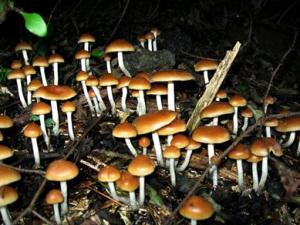Its official: Voters in Denver will go to the polls in May to decide whether to allow residents to use and possess magic mushrooms and psilocybin, the hallucinogenic substance that makes those mushrooms so magic, without fear of criminal penalty. The city's Election Division confirmed last Friday that an initiative petition to decriminalize the mushrooms had received enough signatures to qualify for the May 7 municipal ballot.

Denver is building a reputation as a leader in progressive drug policy. Colorado and Washington were the first states to legalize marijuana in 2012, and in 2016 Denver became the first city in the country to allow for the consumption of marijuana at retail establishments, including bars.
The group behind the initiative, Decriminalize Denver, wants to make the use and possession of psilocybin mushrooms by people 21 and over the city's "lowest law enforcement priority." The initiative would also prevent the city from using its resources to punish adults who are caught using or possessing the mushrooms.
What the proposed ordinance would not do is legalize the sale of the drug in retail shops. One step at a time is the apparent plan.
"We're a pretty progressive city when it comes to drug policy," Decriminalize Denver director Kevin Matthews told NBC News. Still, he said he didn't foresee magic mushroom retail stores similar to pot shops "in the near future."
The initiative has won the approval of the Drug Policy Alliance, which is pushing more broadly for drug decriminalization.
"Under current Colorado law, with the exception of marijuana, simple drug possession can carry felony charges leading to devastating consequences including incarceration and a lifelong criminal record. People across the state want to do things differently," said Art Way, the group's Colorado state director. "While psilocybin is behind a relatively small portion of these arrests, it's terrific that Denver voters will have the opportunity to chip away at the drug war through this initiative."
Even if the initiative were to pass, magic mushrooms would remain illegal under both state and federal law, which considers them a Schedule I controlled substance -- the most dangerous, with no approved medical use and high potential for abuse--a designation shared with heroin, ecstasy, and, bizarrely enough, marijuana.
But are magic mushrooms really so dangerous? The Global Drug Survey, with more than 120,000 participants in more than 50 countries, doesn't think so. Of the more than 12,000 people who reported taking the drug in the 2016 survey, only 0.2 percent required emergency medical treatment, a rate dramatically lower than for ecstasy, LSD, or cocaine.
"Magic mushrooms are one of the safest drugs in the world," addiction psychiatrist and Global Drug Survey founder Adam Winstock told The Guardian, adding that the biggest risk was that people could pick and eat the wrong mushrooms. "Death from toxicity is almost unheard of with poisoning with more dangerous fungi being a much greater risk in terms of serious harms."
Still, magic mushrooms aren't completely harmless, Winstock said. "Combined use with alcohol and use within risky or unfamiliar settings increase the risks of harm most commonly accidental injury, panic and short-lived confusion, disorientation and fears of losing one's mind." In some cases, people can experience panic attacks, he added, advising people who are thinking about using them to "plan your trip carefully with trusted company in a safe place and always know what mushrooms you're using."
Come May, we will see whether voters in Denver are ready to take the next step in progressive drug reform.
This article was produced by Drug Reporter, a project of the Independent Media Institute.
Drug Policy Alliance is a financial supporter of Drug War Chronicle.
This work by StoptheDrugWar.org is licensed under Creative Commons Attribution-ShareAlike 4.0 International
Comments
prospects
On one hand, not that many people take 'shrooms, so there won't be a big interest group pushing for it as with cannabis.
OTOH, not that many people take 'shrooms, so there won't be a big interest in stopping them.
Add new comment